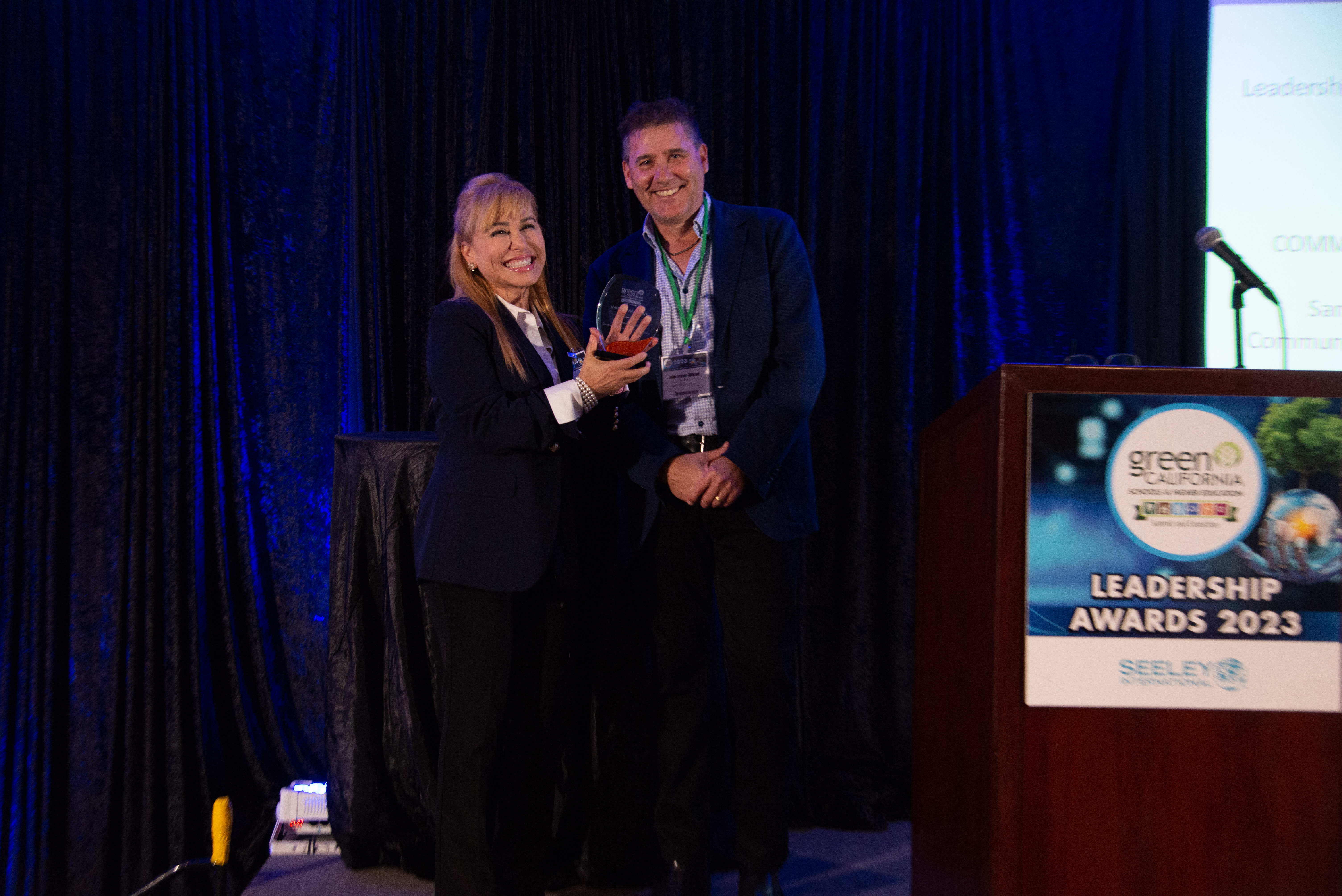
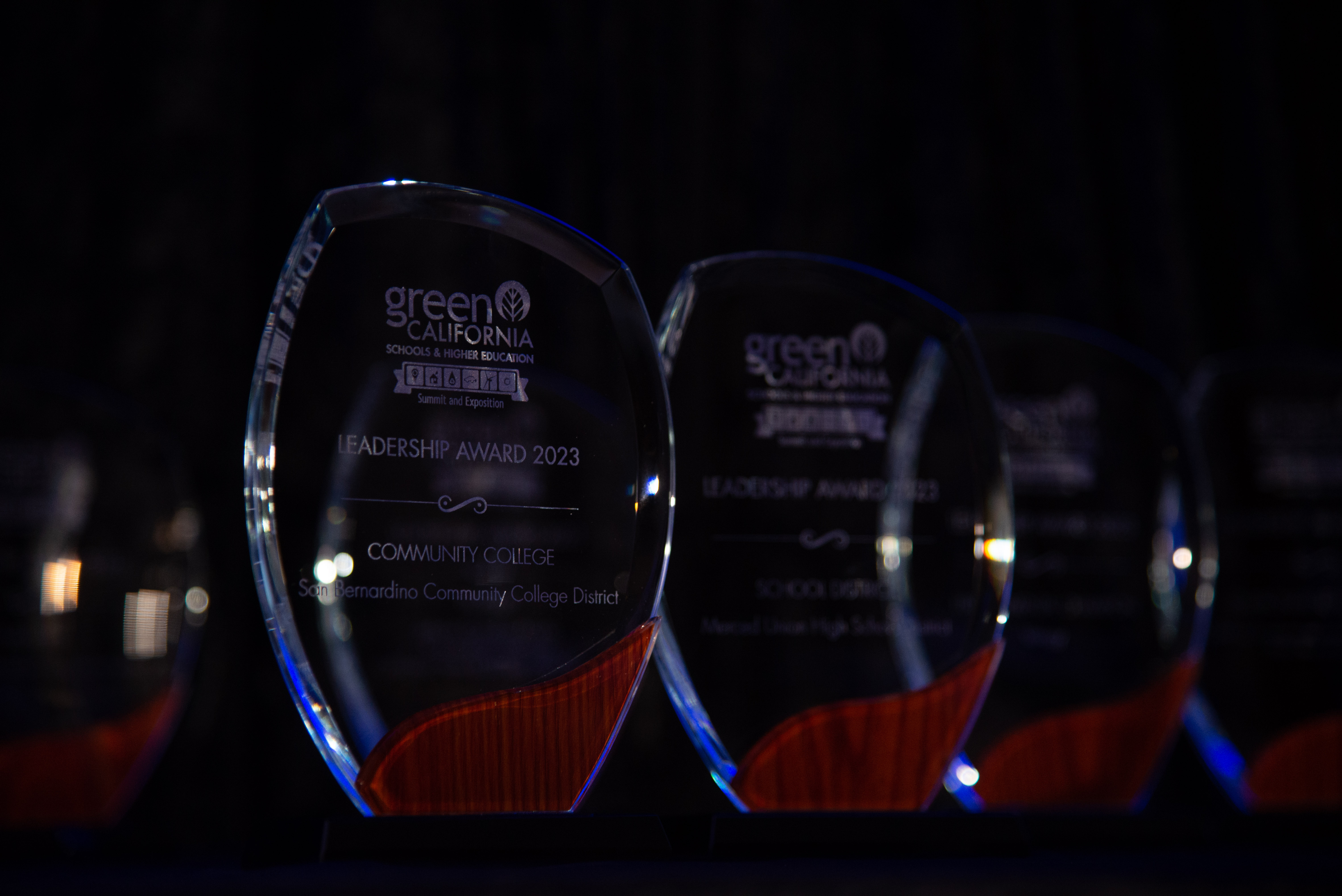
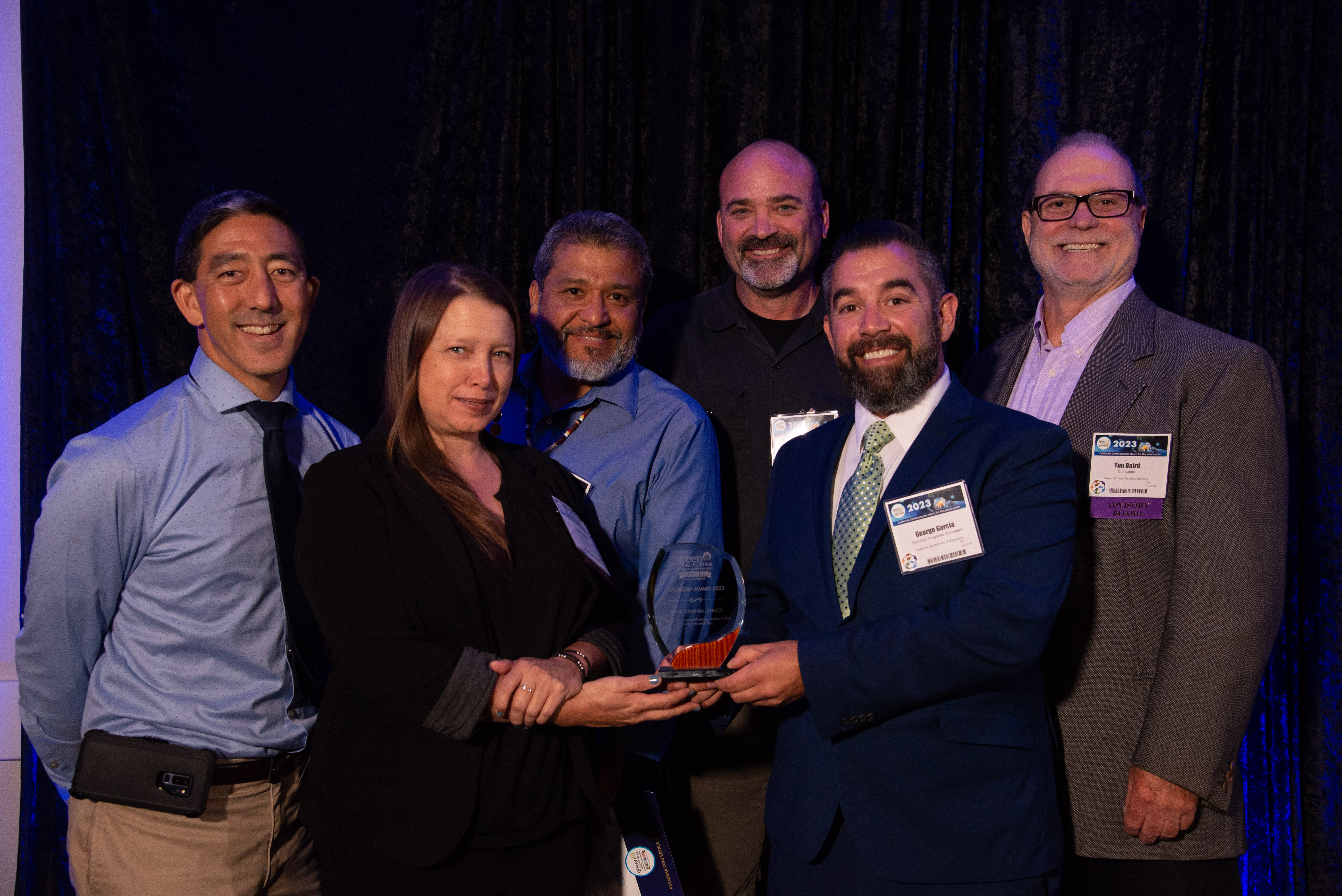
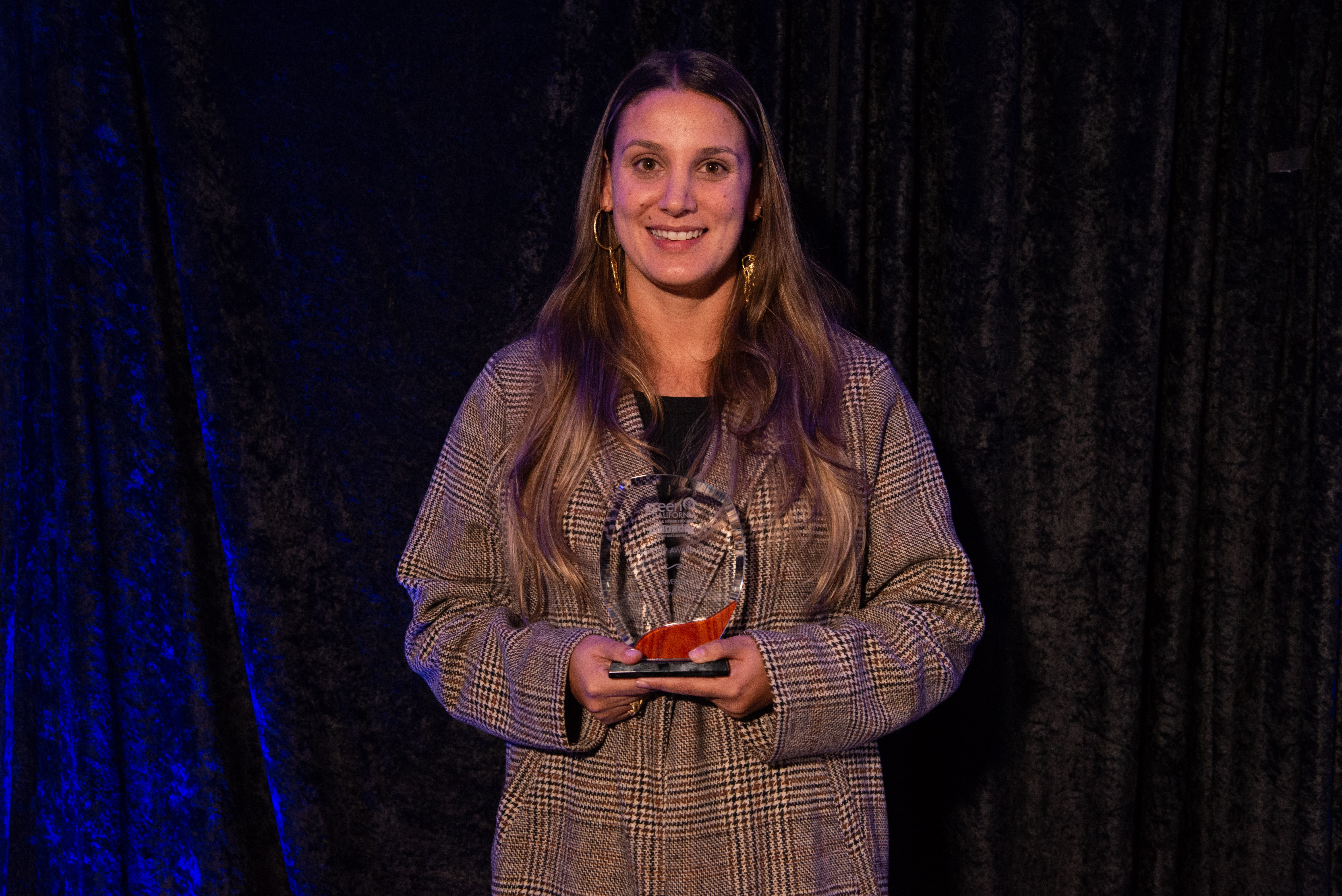
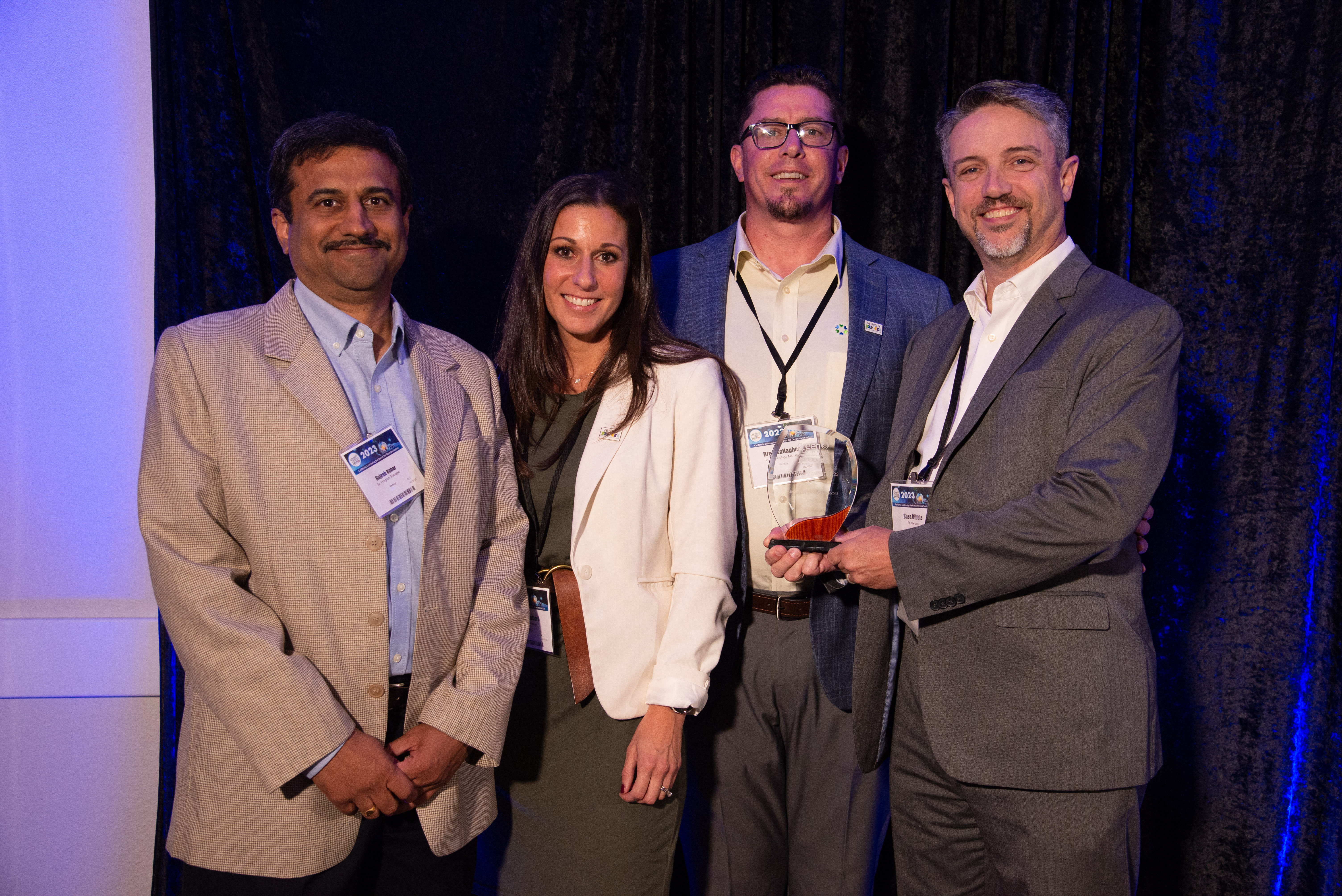
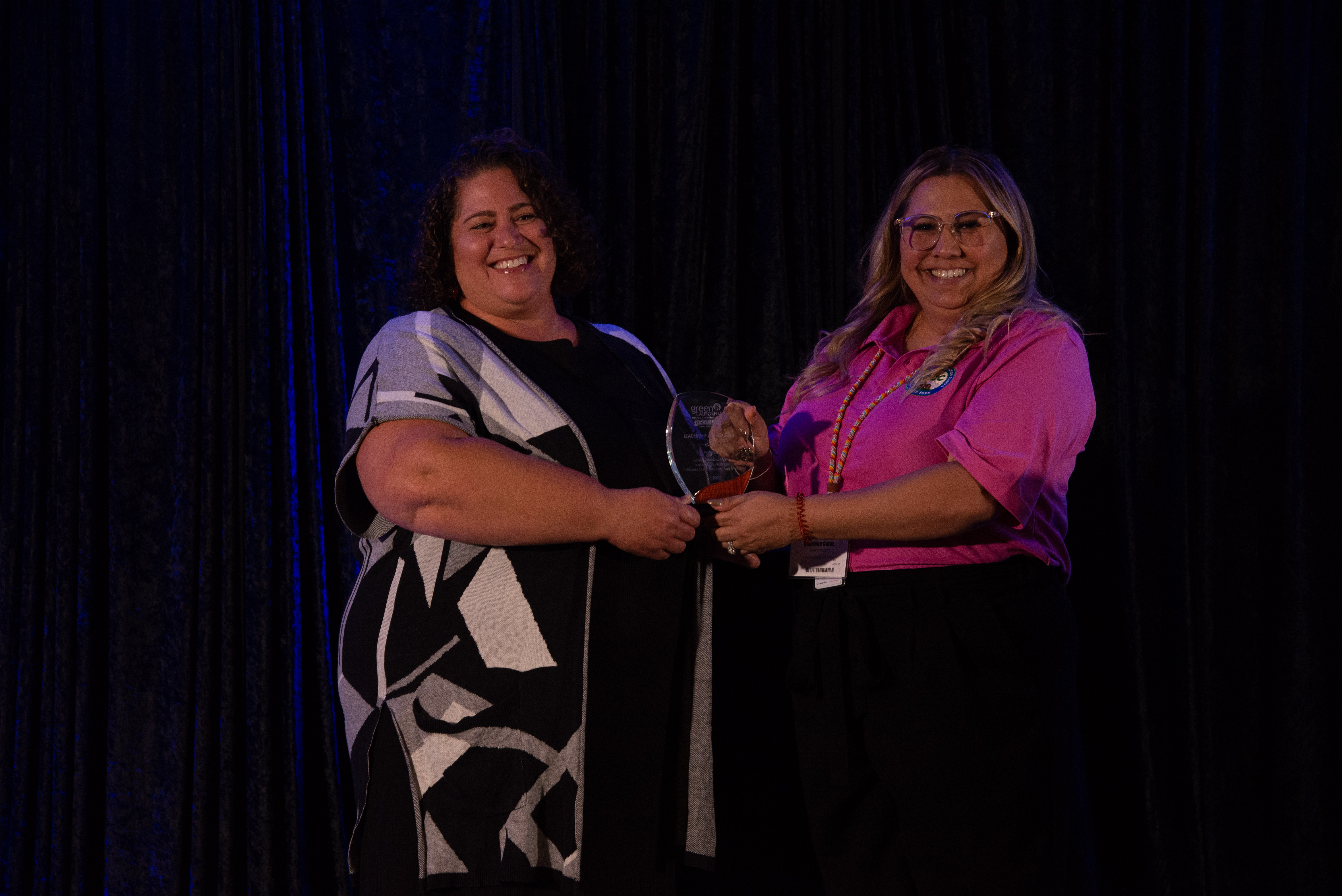
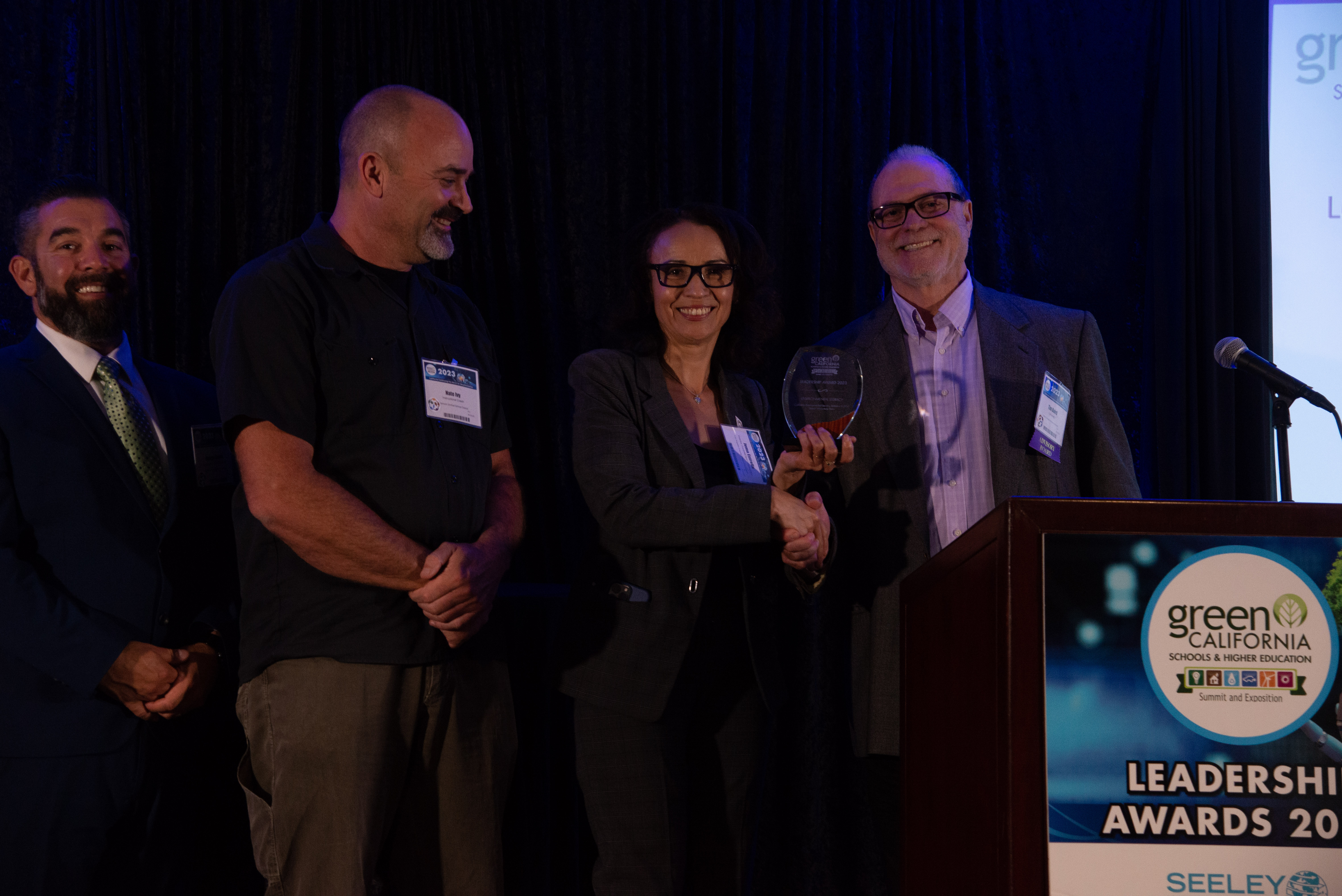
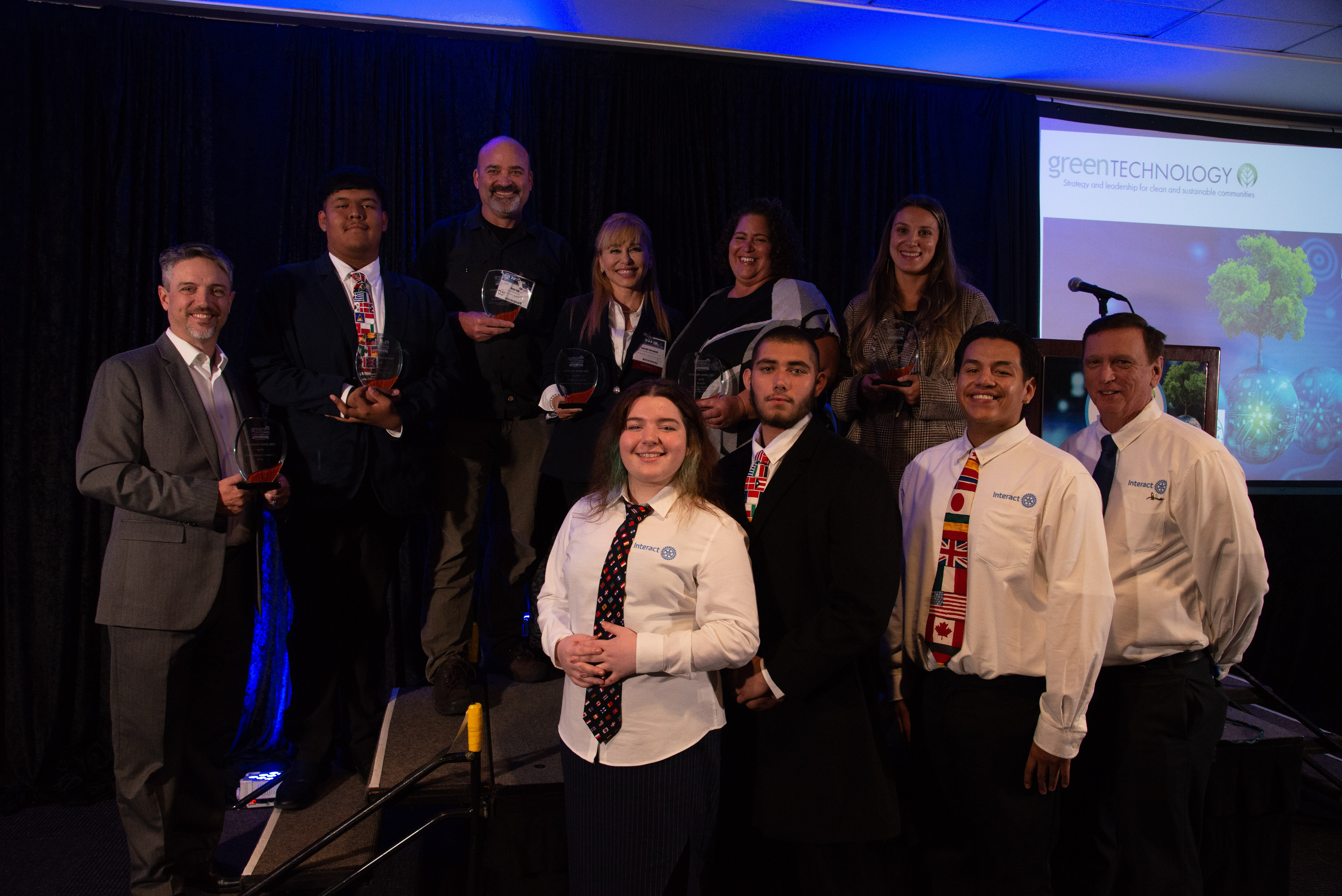
Green Technology’s Leadership Awards aim to recognize and honor individuals, organizations, and institutions that have made significant contributions to advancing sustainability efforts and reducing carbon footprints in various sectors. These awards serve as a platform to acknowledge and celebrate the exceptional work done by stakeholders and leaders in promoting green technologies and practices.
The categories for recognition can vary based on the specific focus areas and priorities of the state and its sustainability goals. Here are the categories for recognition at the October 2023 Green California Schools & Higher Education Summit recently held at the Pasadena Conference Center in Pasadena, California:
- Community College
- Environmental Champion
- School District
- Pioneer
- University
- Environmental Literacy
COMMUNITY COLLEGE
San Bernardino Community College District
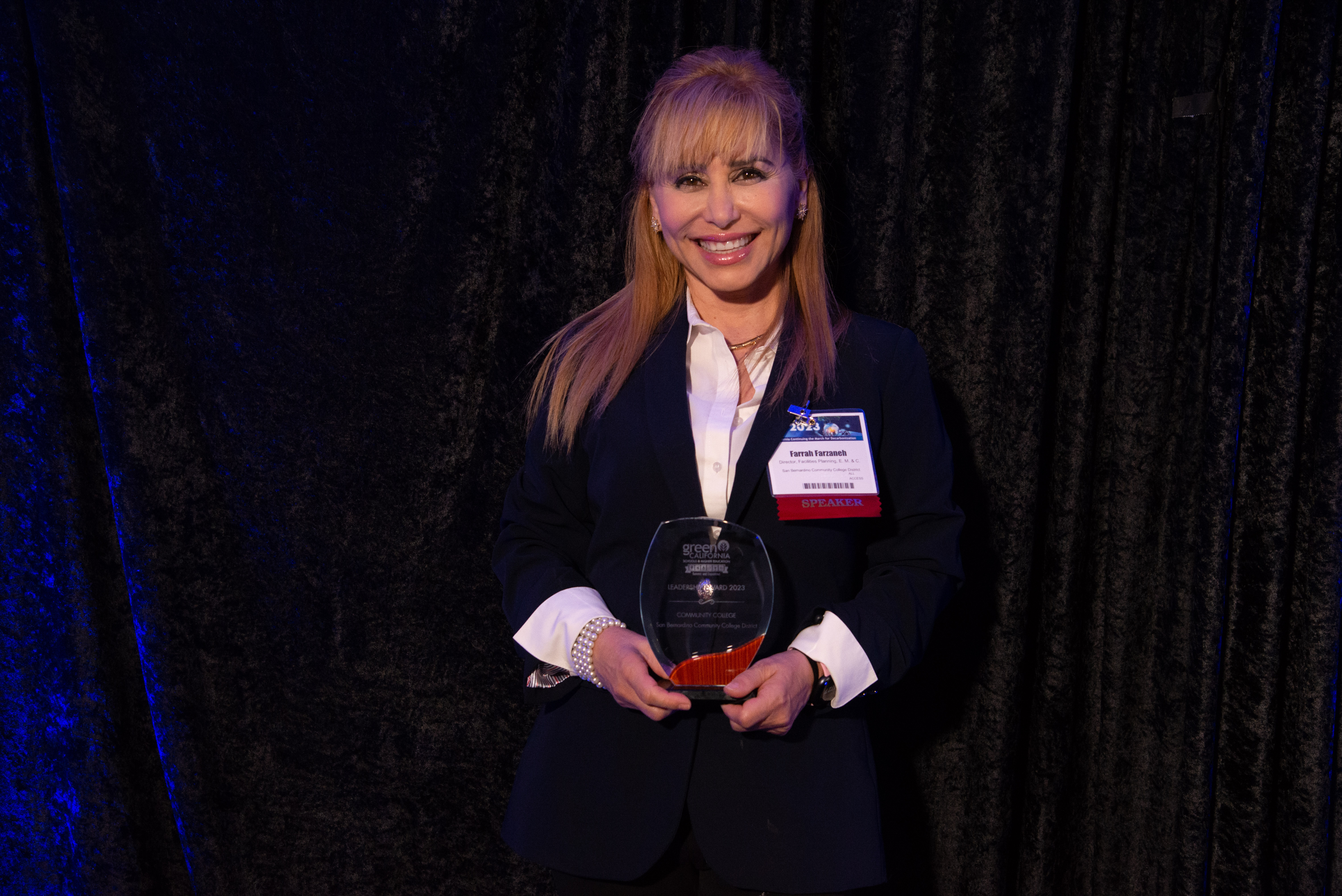
San Bernardino Community College District & Farrah Farzaneh, the Director of Facilities Planning, Emergency Management & Construction have spearheaded a holistic Sustainability Strategy that has become the cornerstone of the district’s operations. This comprehensive plan extends its reach into community engagement, cultural transformation, professional collaborations, sustainable design, and infrastructure development.
Through strategic partnerships with engineering, design, and utility sectors, SBCCD strives to exceed California’s rigorous environmental benchmarks. Their projects embody a ‘living-lab’ approach, seamlessly integrating innovative design principles with educational opportunities. This approach not only promotes sustainability but also fuels the
growth of the green job market, ensuring a skilled and knowledgeable workforce for the future.
From sustainable facility designs and renewable energy integration to eco-friendly procurement practices and electric vehicle charging stations, SBCCD’s initiatives empower local communities and foster a more resilient local economy. Their collaborative efforts with utility providers underscore their unwavering dedication to sustainability, resulting in mutual benefits, securing funding while creating synergy that is driving the success of sustainable projects.
Their innovative ‘living lab’ methodology serves as a model for sustainable projects. These real-world initiatives not only provide students with hands-on experience but also effectively communicate sustainability concepts to the broader community, fostering greater understanding and engagement. Sustainable building practices and technologies, energy-efficient insulation, and low-flow water fixtures, are incorporated into new construction and renovation projects. There are now at least 10 LEED certified buildings throughout SBCCD.
The beneficiaries of this exemplary work extend far and wide. Students, local communities, the workforce, the environment, and educational institutions all reap the rewards of SBCCD’s commitment to sustainability. As they inspire a new generation of green industry professionals, educate and inform other educational institutions, and drive measurable reductions in energy consumption, carbon emissions, and water usage, they leave an indelible mark on a shared journey towards a more sustainable future.
ENVIRONMENTAL CHAMPION
Veregy

For over 30 years, Veregy has been a national leader in professional energy consulting and construction services, serving a diverse clientele across the United States, including commercial enterprises, industrial facilities, TK-12 schools, higher education institutions, and local government agencies. Veregy is an award-winning NAESCO-Accredited
decarbonization company focusing on accelerating and simplifying the Energy Transition. They provide turnkey engineering and construction services designed to reduce energy and operating costs through the implementation of energy efficiency and infrastructure upgrades, smart building technology, fleet EV infrastructure, clean energy generation, and sustainability.
Their commitment to sustainability in California is evident through their involvement in over 650 projects involving state, municipal, and educational buildings with many of these initiatives achieving LEED certification, including prestigious LEED Platinum awards. In California, They have partnered with over 80 TK-12 districts, conducting energy audits for over 600 schools, and securing nearly $200 million in funding for energy efficiency, promotion of sustainable practices, and renewable and resilient energy solutions.
In recent projects their dedicated California TK-12 team has collaborated closely with over 25 school districts to capture more than $70M in state-funded grants that will be used to enhance energy efficiency, improve indoor air quality, and create valuable learning experiences for the next generation of energy and climate experts in California.
*ENVIRONMENTAL CHAMPION: This year Green Technology introduces a new category to recognize one of Green Technology’s Sustainability Champions for their work helping to forward the State’s sustainability goals.
SCHOOL DISTRICT
Merced Union High School District
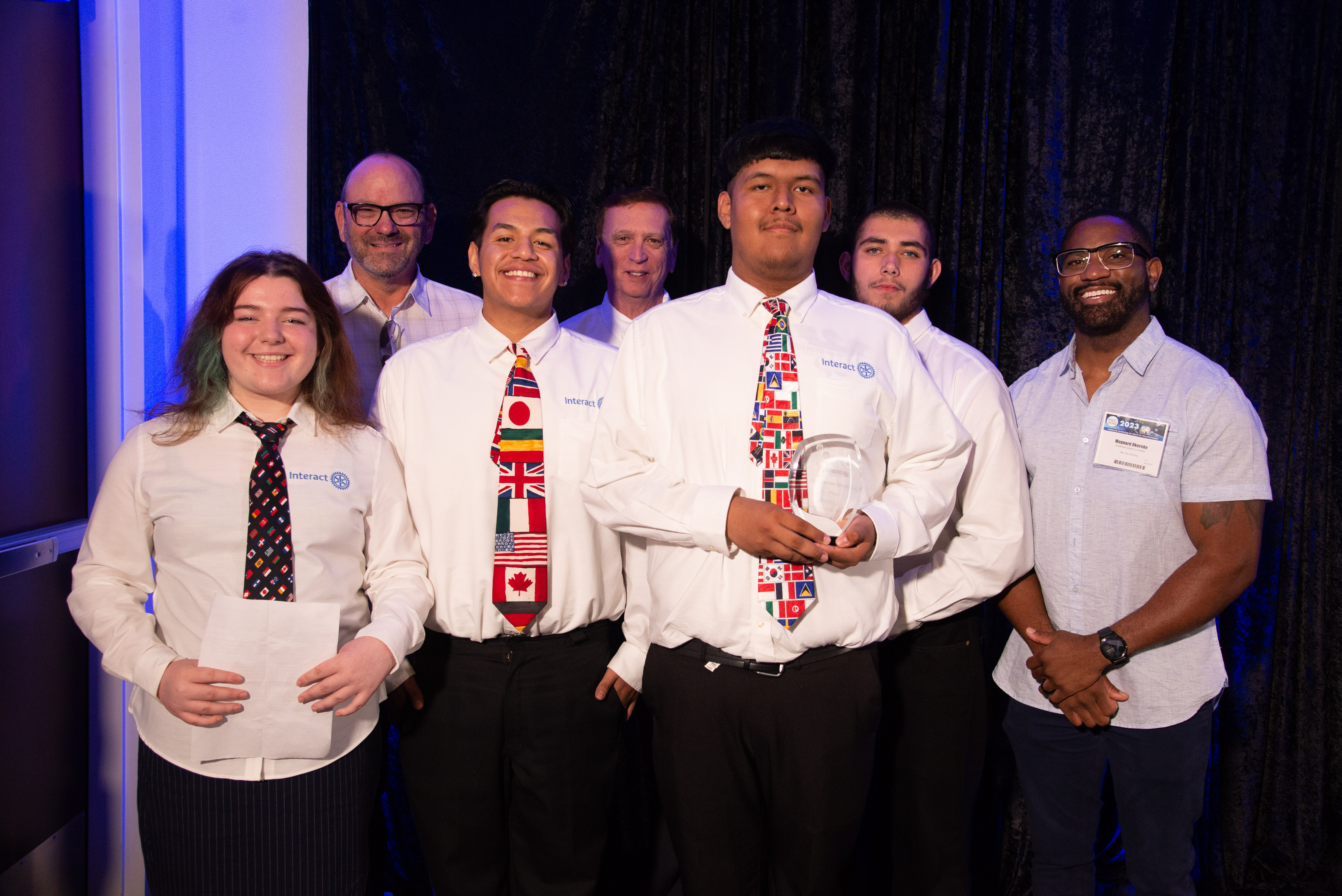
Merced Union High School District’s remarkable contribution to education and community development through the “Green That School” (GTS) project is nothing short of inspiring.
The GTS project unites students from two vastly different corners of the world: the Daraja Academy in Nanyuki, Kenya, and the Merced Union High School District in the United States. This initiative, under Scott Weimer, Assistant Superintendent of Business and Student Services’ leadership, addresses pressing issues such as gender violence, quality education, and arranged marriages while opening doors to educational and professional opportunities through Career Technical Education (CTE) and advocating for women’s participation in STEM fields.
The GTS project harnesses the power of international collaboration. By partnering with organizations like the United Nations, the 17 Sustainable Development Goals (SDGs), Rotary, and the US Department of Education’s Green Ribbon Schools program, Scott and his team have amplified their impact on both a national and global scale. At the Daraja Academy in Kenya, we witness a 100% graduation rate, demonstrating the life-changing impact of this initiative.
These graduates are not just educated; they are empowered to pursue their chosen career paths, showcasing the project’s capacity to transform lives. Similarly, in the Merced Union High School District, students directly involved in the GTS project exhibit a remarkable 100% high school graduation rate, highlighting the project’s influence on academic persistence and success. In the next 3-5 years, the project aims to continue providing essential infrastructure to support institutions like the Daraja Academy. Moreover, their “Take Art Serious” program will play a vital role in raising awareness of the UN’s Sustainable Development Goals, fostering a global community committed to combating climate change and addressing critical global challenges.
The project’s innovation lies in its holistic approach to education, emphasis on real-world problem-solving, and commitment to fostering global citizenship and environmental stewardship among students. It exemplifies responsible and socially aware students who can drive positive change.
PIONEER
Juliana Goodlaw-Morris
Sustainability Manager
California State University, San Marcos
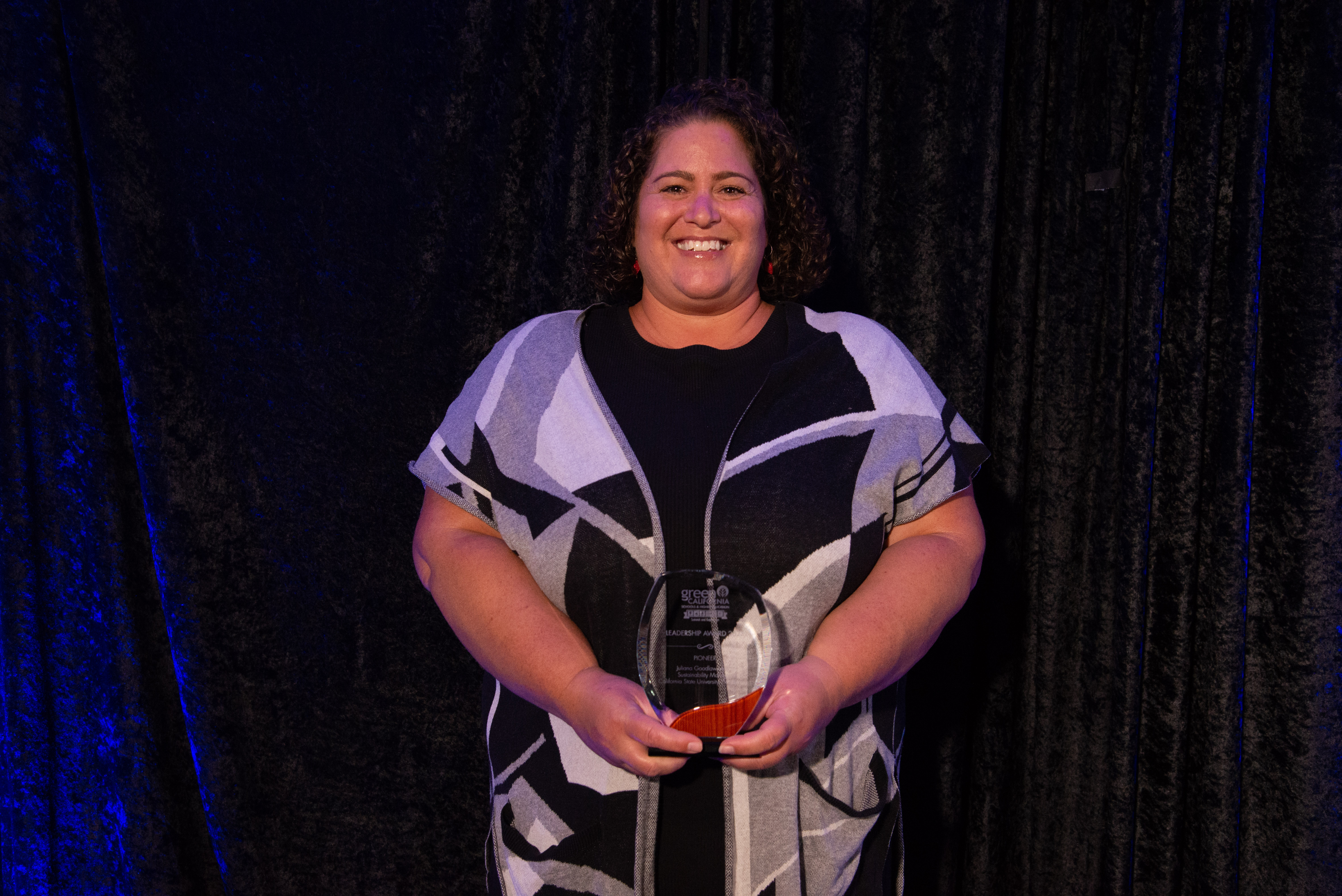
Juliana Goodlaw-Morris and California State University, San Marcos (CSUSM) have embarked on a transformative journey towards sustainability and waste management with a resolute commitment to achieving zero waste by 2025 as a central pillar of their Sustainability Master Plan. Their innovative approach to waste reduction and community engagement has yielded remarkable results and benefits for both their campus and the environment.
CSUSM has implemented a comprehensive waste reduction strategy that encompasses proper labeling and color-coding of waste bins in alignment with SB 1383 standards. This approach promotes responsible waste disposal and recycling throughout the campus. All bins on campus, from classrooms to office spaces, have been rightsized to minimize waste generation. This efficient use of resources ensures that waste bins are appropriately scaled to the needs of each location, reducing unnecessary landfill waste. The installation of 42
sets of Bigbelly waste bins across campus has revolutionized waste collection. These touchless bins include landfill, recycling, and compost options, making it easy for the campus community to participate in sustainable waste disposal practices.
California State University, San Marcos conducts annual move-out and move-in donation events at the dormitories. These events divert thousands of pounds of items from the landfill, benefiting students through the redistribution of household items, food, and clothing. The campus collects office supplies from various departments and redistributes them to the campus community, reducing the need for new purchases and promoting resource conservation.
One of the most innovative aspects of their program is the Zero Waste and Donation Pick-Up Form. This online form streamlines the process of requesting and scheduling donation pick-ups, significantly reducing administrative time and promoting sustainability. Through their zero-waste promotion, programming, and projects CSUSM composting efforts have increased and the amount of waste going to the landfill decreased. Compost increased from about 23 tons in 2019 to about 77 tons in 2022, and our waste to landfill decreased
from about 657 tons to 610 in that same time frame. They have completed 168 donation pick-up requests and have diverted over 6,000 pounds from going into the landfill since March 2022. Their program also includes the implementation of a technology that enhances efficiency and provides a transparent, data-driven approach to tracking donations and waste diversion efforts.
UNIVERSITY
California State University, Sacramento

California State University, Sacramento demonstrates their leadership and commitment to sustainability and innovation in waste reduction. CSU Sacramento has established a Single-Use Plastics Policy that helps reduce the use of single-use plastics across the CSU system. In response to this policy CSU Sacramento’s Office of Sustainability embarked on a mission to fi nd an innovative and cost-effective solution to address the use of single-use plastic water bottles on campus. Their solution, the Water Monster Hydration Stations, exemplifies
sustainability efficiency. By strategically deploying mobile hydration stations with filtration systems at university events, CSU Sacramento provides clean drinking water while effectively replacing countless single-use plastic bottles with an eco-friendlier alternative. This initiative not only aligns with the CSU Single-Use Plastics policy but also echoes the institution’s broader commitment to achieving zero waste by 2030. The impact of this endeavor is far-reaching. It benefits the entire campus community, including students, faculty, and staff, while also extending its positive influence on the surrounding community and the local municipality. By eliminating the need for 1,000 plastic water bottles per station, per event, CSU Sacramento is making measurable strides in reducing plastic waste. The Water Monster Tanks, each with a 125-gallon capacity, embody resource conservation by harnessing local water sources. This not only reduces the carbon footprint associated with the production and transportation of bottled water but also demonstrates cost efficiency, allowing the university to redirect funds towards other essential event aspects.
CSU Sacramento’s initiative also helps foster behavioral change by educating attendees about the environmental impact of single-use plastics and encouraging the adoption of reusable alternatives. Their measurable results, innovative solutions, and dedication to a sustainable future set a shining example for institutions nationwide. In addition to all that California State University of Sacramento implemented an innovative solution to modern consumption challenges, called Hornet Reuse. Hornet Reuse was a waste pilot project in the form of a mobile app that connects students, faculty, and staff for the exchange of items for free. Its multifaceted impacts encompass waste reduction, financial savings, carbon footprint reduction, and community building. The initiative’s success illuminates a promising path toward a future where sustainable resource management and vibrant community interaction go hand in hand. Due to the impressive success of the initial pilot project, the app is being re-designed as a component of my sac state and will be required for all staff to use before the purchase of any new office furniture. This new requirement will result in cost savings, waste reductions, and greenhouse gas emissions reductions soon.
ENVIRONMENTAL LITERACY
California Environmental Literacy Initiative (CAELI)
District Innovation Hub

The California Environmental Literacy Initiative’s (CAELI) District Innovation Hub is a diverse collection of representatives from school districts and community partners across California working to achieve the goal of environmental literacy for all of California’s 5+ million public school students. The hub views school districts as an essential unit of change for ensuring that environmental learning opportunities are available to every student.
The CAELI District Innovation Hub aims to 1) build a community of school district practitioners and partners, 2) curate and share environmental literacy and sustainability resources, 3) build capacity for district planning for systemic environmental literacy and sustainability, 4) cultivate, support, and showcase leading edge exemplars, and 5) research, design, and deliver the best green district support strategies. To tackle these goals, the CAELI District Innovation Hub has organized several projects to share best practices and bring together a network of district sustainability leaders. Two of these projects include an in-person gathering at the Green California School and Higher Education Summit and a series of informative webinars supporting district sustainability.
Work done by the District Innovation Hub gives district sustainability leaders the knowledge and tools to make substantive changes at the district level. These changes are designed to create system wide impacts. Ultimately, the beneficiaries of these district wide impacts will be the students, staff, families, and communities of these districts. The Innovation Hub 2022-23 Webinar series featured stories and approaches of a diverse mix of districts across California working to ensure comprehensive access to environmental literacy.
Finally, the District Innovation Hub has supported the overall work of CAELI to address environmental literacy across California. These efforts have resulted in CAELI creating new working groups addressing data collection and providing support for Green Ribbon applicants.
The importance of these awards lies in their ability to inspire and motivate individuals, organizations, and communities to adopt sustainable practices and technologies. By recognizing and honoring the efforts and achievements of sustainability leaders, the awards create role models and showcase success stories that can drive further progress. The awards also provide a platform for networking, collaboration, and knowledge sharing among stakeholders, fostering a sense of community and shared responsibility for environmental stewardship.
Overall, the Leadership Awards play a vital role in promoting and accelerating the transition towards a more sustainable future.
Congratulations to all award winners!!
Resources for more information:
Veregy: https://veregy.com/
California Environmental Literacy Initiative: https://ca-eli.org/
Photo credit: Cody McGibbon
